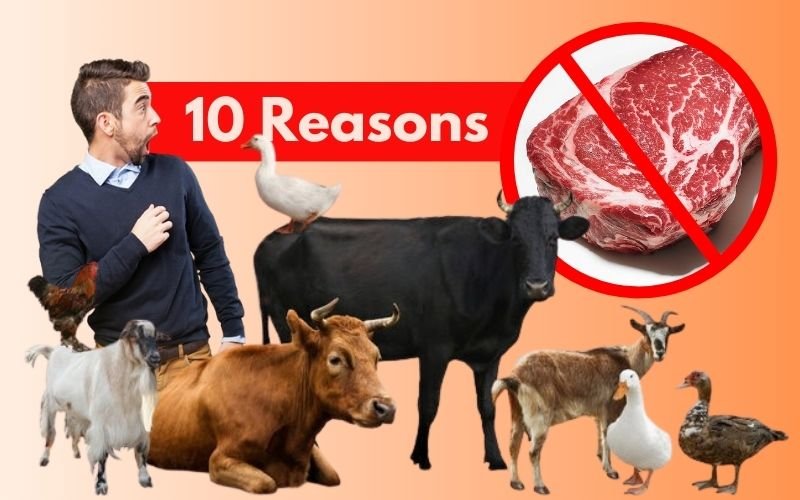Food plays a significant role in our health, the environment, and animal welfare. According to Healthline, the rising global rates of conditions such as diabetes, heart disease, and obesity are partially linked to non-vegetarian (meat) diets. Moreover, choosing non-veg diets contributes to environmental harm and the loss of approximately 2.7 trillion animal lives annually.
To prioritize our health and support sustainability, it’s crucial to reassess our dietary choices and consider healthier meat alternatives. In this blog, we’ll examine 10 reasons not to eat meat or animals and explore nutritious meat alternatives.
10 Reasons Not to Eat Meat or Animals
The reasons for abstaining from meat consumption encompass broader concerns for our planet and its inhabitants, including ourselves.
1) Be Healthy
Consuming meat can have severe impacts on human health. Red and processed meats contain high levels of saturated fat and cholesterol, which can contribute to plaque buildup in the arteries, thereby increasing the risk of heart disease.
Additionally, according to the International Agency for Research on Cancer (IARC), these types of meats are classified as carcinogenic to humans, potentially raising the risk of cancer.
Consuming 50 grams of processed meats like bacon, ham, and sausages heightens the likelihood of coronary heart disease by 18%.
As per a WHO report, the consumption of 50 grams of processed meat amplifies the risk of colorectal cancer by 18%.
Moreover, according to a Healthline article, there is a connection between red and processed meat consumption and an increased likelihood of developing type 2 diabetes.
Considering these health concerns, opting for plant-based alternatives like mock meat can offer a healthier choice for long-term well-being.
2) Better Environmental Impact
Livestock significantly impacts the environment, particularly through deforestation, greenhouse gas emissions, utilization of water, and various pollution.
Approximately 70% of deforestation worldwide can be attributed to the animal industry, with nearly 40% of deforestation specifically for creating grazing land for farmed animals.
Deforestation not only destroys wildlife habitats and disrupts biodiversity but also diminishes the Earth’s capacity to absorb carbon dioxide.
Methane, a potent greenhouse gas, contributes substantially to climate change, with approximately 37% of methane emissions originating from livestock. The primary sources of methane emissions are their digestive processes, manure, and processing.
Methane emissions exacerbate climate change, leading to adverse effects such as floods, droughts, sea level rise, and glacial melting.
The production of meat requires a significant amount of water, ranging from 5,000 to 15,000 liters per kilogram. This water is consumed by the animals themselves and is also used in growing the crops they eat. Moreover, the disposal of animal manure leads to water pollution, adversely affecting aquatic ecosystems when this contaminated water enters rivers and seas.
By choosing a plant-based diet, you spare the lives of 365 animals, conserve 1.5 million liters of water, preserve 6575 kg of grains, safeguard 1096 square meters of forest land, and reduce CO2 emissions by 3287 kg annually.
3) Solve Hunger Crisis
Roughly 45% of the world’s land is allocated to agriculture, with 80% dedicated to animal farming and only 16% to crops for direct human consumption. Conversely, 800 million people suffer from hunger and sleep hungry every night, with an additional 2.3 billion experiencing food insecurity. Tragically, hunger-related illnesses claim the lives of about 9 million individuals annually.
In global food distribution, 48% of cereals are consumed directly by humans, while 41% are fed to animals. Research suggests that substituting just 20% of beef consumption with plant-based proteins could open up an area equivalent to South America for agricultural purposes.
According to a United Nations report, repurposing land currently dedicated to animal feed crops could potentially provide enough land to provide food grains to feed an additional 3.5 billion people.
The rise in global hunger is closely linked to meat consumption. Transitioning to plant-based alternatives could be a solution to alleviate this issue.
4) Save Billions of Lives
Animal welfare is a central consideration. 80 billion land-based animals (bovines, goats, chickens, pigs, sheep, etc.) & 2.724 trillion aquatic animals (fish, shrimp, octopus, etc.) are killed for human consumption every year.
Animals raised for meat endure cramped, unsanitary conditions on farms, leading to physical and psychological distress.
Many animals undergo painful procedures without anesthesia, such as chicks being decapitated and pigs undergoing tail docking.
Despite their innocence, they fall victim to human violence. Observing their innocent gaze evokes a profound sense of connection.
Animals, like humans, experience emotions such as happiness, sadness, affection, etc. They share many traits with us, yet we consume them. Reflecting on how we would feel if subjected to similar treatment prompts empathy.
Animals deserve our care, though our primary aim is their consumption. Let us opt for compassionate choices and liberate animals from being consumed. Moreover, we have numerous plant-based alternatives for meat, which will be discussed further below.
5) Avoid Bird Flu
The poultry industry confines animals in cramped and unsanitary conditions, facilitating the spread of diseases such as bird flu. Once transmitted from one animal to another, these viruses can mutate, potentially posing risks to humans.
Bird flu can persist in raw meat for extended periods, posing a risk of transmission to humans. Additionally, contact with infected animals can lead to infection.
The virus can endure in animal tissues, feces, water, and contaminated surfaces, further increasing the likelihood of transmission.
6) Increase Your Lifespan
Numerous reports suggest that individuals following a vegan diet tend to have longer lifespans compared to those consuming non-vegetarian diets. This is attributed to the abundance of nutrients and fiber in vegan diets, which primarily consist of fruits, vegetables, legumes, and whole grains. These dietary choices are known to mitigate the risk of chronic conditions such as heart disease, type 2 diabetes, and certain cancers.
Conversely, non-vegetarian diets typically contain higher levels of saturated fat and cholesterol, thereby increasing susceptibility to ailments like chronic disease.
Research indicates that a significant portion of individuals embracing a vegan lifestyle maintain a healthy weight, engage in regular exercise, and refrain from smoking, all of which contribute to their overall well-being and extend their lifespan.
7) Solve Water Crisis
Between 20% to 33% of freshwater, consumption is attributed solely to the livestock industry, equating to approximately one-third of the world’s freshwater used for the production of meat and dairy products.
The majority of this water is allocated to growing crops for livestock. As per the report, producing 1kg of beef necessitates about 15,000 liters of water, while 1 liter of milk requires roughly 1,000 liters, and one egg demands around 200 liters of water.
Approximately 2 billion people globally lack access to fresh water. To ensure universal access to this vital resource, transitioning away from meat consumption and embracing a plant-based diet is imperative.
8) Save Your Money
Plant-based proteins such as lentils, beans, and tofu offer a more cost-effective option per gram of protein compared to meat. In October 2023, ground beef was priced at $5.23, while 15 ounces of chickpeas cost approximately $1, offering a higher protein content as well.
Meat consumption is a significant contributor to obesity, with estimated societal costs in the United States surpassing $170 billion, alongside $200 billion allocated for heart disease treatment.
In conclusion, opting for plant-based proteins like lentils not only provides a more economical choice but also offers higher protein and fiber content without adverse health effects associated with meat consumption.
9) Avoid Antibiotics
Livestock receive antibiotic injections to prevent disease transmission in densely populated environments. However, overuse of antibiotics leads to the development of antibiotic-resistant bacteria in animals, posing risks to human health.
10) Save Biodiversity
Approximately 80% of deforestation stems from animal agriculture, This widespread deforestation leads to the extinction of approximately 50,000 species annually.
Overgrazing of farmed animals exacerbates the issue by depleting soil nutrients, rendering it incapable of sustaining diverse plant and animal populations. To mitigate the risk of further species extinction, transitioning to a plant-based diet is imperative as a sustainable alternative to consuming meat.
Plant-Based Protein Alternatives
Here are some excellent plant-based protein alternatives:
- Soybeans
- Lentils
- Beans
- Nuts
- Seeds (such as almonds, peanuts, cashews, chia seeds, and hemp seeds), and quinoa.
These options offer protein along with essential nutrients like healthy fats, vitamins, and minerals.
More for you:
What is a Vegan and What Do They Eat? Complete Guide
Conclusion
Now that you’re familiar with the top 10 compelling reasons to consider giving up meat, it’s evident that adopting a plant-based diet can pave the way for a healthier dietary regimen.
Transitioning away from meat can also be financially advantageous. Fortunately, there exists a variety of affordable plant-based protein sources that you can readily incorporate into your meals, often at a lower cost compared to meat products.
Your motivation for quitting meat and adopting a plant-based lifestyle may stem from compassion, health concerns, environmental consciousness, biodiversity preservation, or financial considerations. Whatever the impetus, making this decision holds significant importance. I encourage you to share this blog so that others may also join in this commendable endeavor.

Andy, the vegan activist, is profoundly enthusiastic about witnessing a world devoid of all forms of cruelty and brimming with love for one another. read more…


Leave a Reply